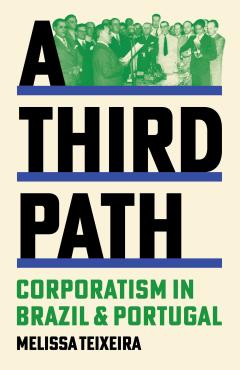Melissa Teixeira is a historian of modern Brazil, with interest in legal history and the history of economic life. She is the author of A Third Path: Corporatism in Brazil & Portugal, published with Princeton University Press (2024). A Third Path explores Brazil’s response to the political, economic, and social crises of capitalism following the Great Depression. It highlights the pivotal but understudied interwar experiment with corporatism, a model that promised a “third path” between capitalism and communism. The book argues that corporatism transformed the Brazilian state into an agent of economic development, and explains why it matters that this transformation was engineered under an authoritarian regime. The book adopts a novel approach to the history of economic life by incorporating wide-ranging legal, economic, and cultural sources to document the process of state-building from the perspective of government ministries and grocery markets alike. It further innovates with its comparative and transnational approach to state-led efforts to reorganize the national economy by drawing upon connections to the New Deal in the United States, Italian Fascism, and the Portuguese Estado Novo.
Teixeira is now researching a new project, titled Inflation and the Making of Brazilian Democracy, on how inflation shaped the undoing and remaking of democracy in postwar Brazil. The project begins with the economic crises surrounding the 1964 military coup and spans experiments to tame inflation and hyperinflation in the 1980s and 1990s, culminating with the 1994 Real Plan. Beyond macroeconomic trends, this project asks how economists, technocrats, consumers, bankers, and industrialists tried to fix or live with inflation. It offers an intellectual history of economic policymaking alongside a social history of how citizens hoarded or spent money amid constantly shifting economic rules, black markets, and declining real wages. In Brazil, decades of economic crisis shaped struggles for democratic accountability, social mobility, and economic justice. This makes Brazil an ideal case for studying government’s role in stabilizing prices, and how inflation shapes democratic governance and expectations.
Her broad research interests include the history of Brazil, Latin America, and the wider Lusophone world, economic history and the history of economic ideas, constitutionalism and legal history, the history of the social sciences, global history, and the methodological questions that arise with writing comparative and transnational history.
Teixeira received her Ph.D. in History from Princeton University. She also holds an M.Phil. in Economic and Social History from the University of Cambridge and graduated summa cum laude with a B.A. in History and Economics from the University of Pennsylvania. Prior to her arrival at Penn, Teixeira was a postdoctoral Prize Fellow in Economics, History, and Politics at Harvard University.
Ph.D. Princeton University
M.Phil. University of Cambridge
B.A. University of Pennsylvania
Undergraduate:
HIST/LALS 450: History of Modern Latin America, 1808-present
HIST/LALS 1475: History of Brazil: Slavery, Development, Inequality
HIST 2710: Inflationary Times: Money, Currency, & Debt in History
HIST 3703: Taking Off: How (some) Economies Get Rich
HIST 234: Decades of Extremes: Fascism, Protectionism, Imperialism
Graduate:
HIST 6710: Global History of Capitalism
HIST 660: Law and Economics in Latin America
Books:
A Third Path: Corporatism in Brazil and Portugal (Princeton University Press, 2024).
Articles:
“Living with Inflation: Policymaking and Popular Practices in Search of Price Stability after Brazil’s Economic Miracle,” Radical History Review 151 (January 2025): 153-187.
“Decreto-Lei nº869, autoritarismo e vida econômica cotidiana no Brasil na era Vargas,” Revista de História 184 (2025): 1-31.
“Em busca de um New Deal brasileiro: Oliveira Vianna e as fontes transnacionais da experiência do corporativismo no Brasil,” translated by Juliana Serôa da Motta Lugão, Revista do Instituto Histórico e Geográfico Brasileiro 184, no. 493 (2023): 234-270.
“Austerity without Neoliberals: Reappraising the Sinuous History of a Powerful State Technology,” co-authored with Cristian Capotescu and Oscar Sanchez, Capitalism: A Journal of History and Economics 3, no. 2 (2022): 379-420.
“Law and Legal Networks in the interwar Corporatist Turn: The Case of Brazil and Portugal,” in Crossing Borders: Authoritarianism and Corporatism in Europe and Latin America, edited by António Costa Pinto and Federico Finchelstein (Routledge Press, 2019): 200-217.
“Making a Brazilian New Deal: Oliveira Vianna and the Transnational Sources of Brazil’s Corporatist Experiment,” Journal of Latin American Studies 50, no. 3 (2018): 613-641.


